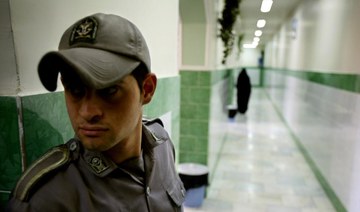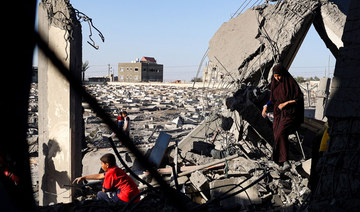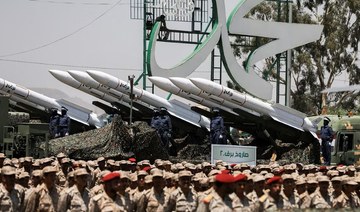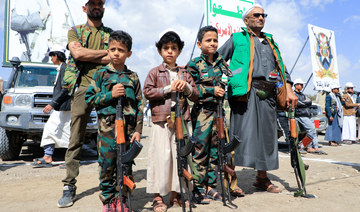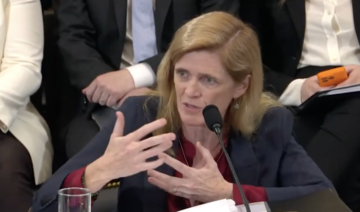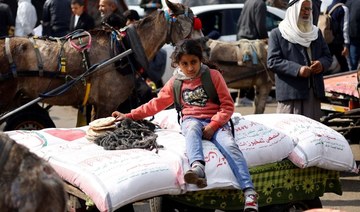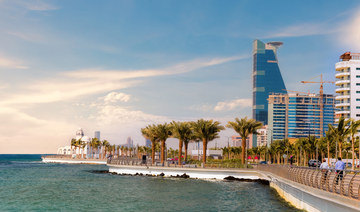DUBAI: Most of the 70 inmates who escaped from a prison in western Iran last month are now back in jail, Iranian authorities said on Saturday, even though about 100,000 prisoners have been granted temporary release due to the coronavirus epidemic.
Iranian media have reported unrest in several prisons in the country, including the March 27 mass escape from the facility in Kurdistan province.
The judiciary’s Mizanoline website said some of the inmates had been captured by security forces, while others returned on their own to the prison in the city of Saqqez.
United Nations human rights spokesman Rupert Colville on Friday voiced concern over a possible coronavirus outbreak in prisons in Iran and other countries.
Iran — the Middle East country worst-hit by the epidemic — has already granted temporary release to about 100,000 inmates to curb prison overcrowding and ease fears of the virus’ spread.
The Health Ministry said on Saturday 158 more coronavirus patients had died in the past 24 hours, bringing the total death toll to 3,452. The total number of cases reached 55,743.
In a rare comment in Britain’s Guardian newspaper, Tehran Mayor Pirouz Hanachi said US sanctions were crippling Iran’s fight against the coronavirus.
“As a result (of sanctions), the ability of my colleagues and I to provide the health, logistical and other essential infrastructure necessary to combat the disease has been drastically reduced. We experience this loss every day, and it can be counted in people that would not have died,” Hanachi said.
Separately, the foreign ministry accused US Secretary of State Mike Pompeo of “medical-terrorism” through the sanctions, which have hit vital sectors such as oil and banking.
“Undisputed fact: US ‘diplomats’ have long been in the business of coups, arming terrorists,” ministry spokesman Abbas Mousavi said on Twitter on Saturday. “But @SecPompeo ... and his masters have taken the ‘job’ to a whole new level: #Medical_terrorism.”
Pompeo and other US officials have stressed that humanitarian supplies are exempt from sanctions Washington reimposed on Tehran after President Donald Trump abandoned Iran’s 2015 multilateral deal to limit its nuclear program.
However, broader US sanctions deter many US and global firms from humanitarian trade with Iran.
Meanwhile state media quoted President Hassan Rouhani as saying that state support for businesses hit by the coronavirus outbreak would be restricted to enterprises that give assurances not to lay off workers.
Rouhani has said 75% of a total budget allocation of about 1,000 trillion rials to address the pandemic would include grants and low-interest loans to enterprises affected by COVID-19.
The total allocated amount is worth some $6 billion at the rial’s free market exchange rate of about 166,000 rials per dollar. But the government may decide to allocate some of the funds at the official rate of 42,000 which is used to subsidise food and medicine.
Iran escaped prisoners back in jail amid coronavirus epidemic
https://arab.news/vwqn8
Iran escaped prisoners back in jail amid coronavirus epidemic

- Iranian media have reported unrest in several prisons in the country, including the March 27 mass escape from the facility in Kurdistan province
- United Nations human rights spokesman Rupert Colville on Friday voiced concern over a possible coronavirus outbreak in prisons in Iran and other countries
Turkish minister warns pro-Kurdish party it could face moves to ban it
“Therefore, we say that if the DEM Party follows the same path, then it will face the same treatment”
ISTANBUL: Turkiye’s justice minister warned the country’s main pro-Kurdish DEM party on Wednesday that it would face the risk of legal action, and even a closure case like its predecessor, if it did not distance itself from Kurdish militants.
DEM, parliament’s third largest party, was established last year as a successor to the Peoples’ Democratic Party (HDP), which is facing the prospect of closure over alleged militant links in a court case following a years-long crackdown.
“In the past, closure cases were opened against parties for supporting terrorism,” Justice Minister Yilmaz Tunc told reporters in Ankara, noting that some parties had been banned and that other cases were ongoing.
“Therefore, we say that if the DEM Party follows the same path, then it will face the same treatment,” he said. “We say keep your distance from terrorism if you do not want to face such a legal process.”
Another court had been expected to announce a verdict this month in a case trying jailed former HDP leaders and officials over 2014 protests triggered by a Daesh attack on the Syrian Kurdish town of Kobani. That verdict was postponed.
“They should not wag their fingers at us. I repeat, the policy of closure, blackmail and threats is over,” DEM Party co-chair Tuncer Bakirhan said on Wednesday in the wake of a call from a government ally to ban the DEM Party.
Critics say Turkish courts are under the influence of the government and President Tayyip Erdogan, which he and his AK Party (AKP) deny.
Both prosecutors and the government accuse the HDP of ties to the militant Kurdistan Workers Party (PKK), which is deemed a terrorist group by Turkiye, the United States and European Union. The HDP denies having any connections with terrorism.
The PKK launched an insurgency against the Turkish state in 1984 and more than 40,000 people have been killed in the conflict. A peace process between Ankara and the PKK fell apart in 2015 and in a subsequent crackdown on the HDP thousands of its officials and members have been arrested and jailed.
UAE, Bahrain call for joint work to contain tensions threatening regional stability
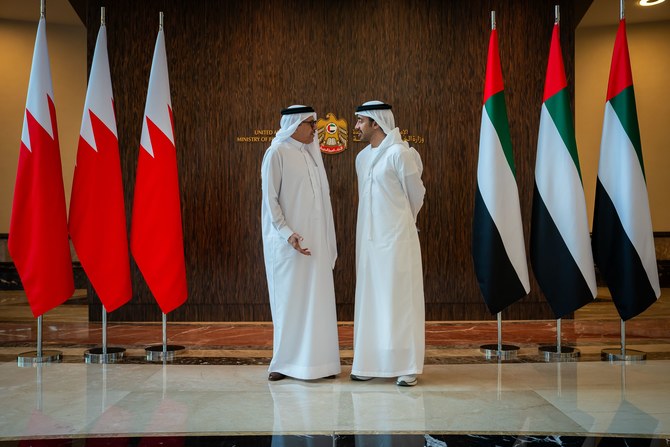
- During a meeting in Abu Dhabi, the ministers discussed the fraternal relations between UAE and Bahrain
DUBAI: UAE Minister of Foreign Affairs Sheikh Abdullah bin Zayed Al Nahyan received his Bahraini counterpart Dr. Abdul Latif bin Rashid Al Zayani in Abu Dhabi on Wednesday.
Sheikh Abdullah bin Zayed welcomed the Bahraini Foreign Minister, and during the meeting held at the ministry’s headquarters in Abu Dhabi, they discussed the fraternal relations between the two countries, and ways to enhance Emirati-Bahraini cooperation at various levels, WAM reported.
Sheikh Abdullah stressed during the meeting that the UAE and Bahrain are linked by historical relations that are becoming more established, developed and growing, and that they also constitute an important tributary to joint Gulf and Arab work.
He also stressed that the current challenges facing the region require intensifying cooperation, coordination and joint work to contain all tensions that threaten its stability, security and safety of its people.
A blast near a ship off Yemen may mark a new attack by Houthis after a recent lull
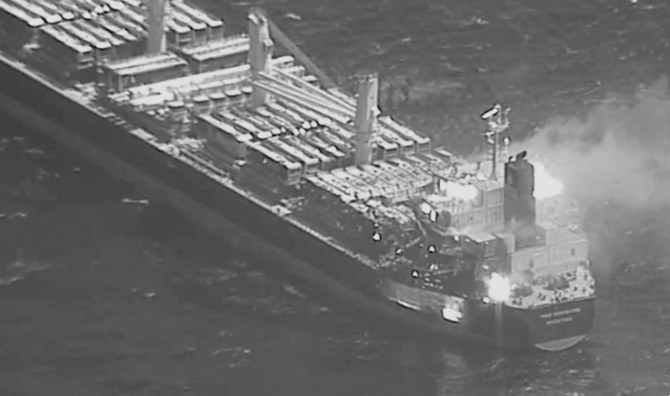
- Houthis have launched more than 50 attacks on shipping, seized one vessel and sank another since November
- The explosion happened some 130 kilometers southeast of Djibouti in the Gulf of Aden
JERUSALEM: A ship near the strategic Bab El-Mandeb Strait saw an explosion in the distance Wednesday, marking what may be a new attack by Yemen’s Houthis through the crucial waterway for international trade.
The explosion, reported by the British military’s United Kingdom Maritime Trade Operations center, comes after a relative lull from the Houthis after they launched dozens of attacks on shipping in the region over Israel’s ongoing war on Hamas in the Gaza Strip.
The Houthis did not immediately claim responsibility for the blast, but suspicion fell on the group as they’ve repeatedly targeted ships in the same area. It typically takes the Houthis several hours before acknowledging their assaults.
The explosion happened some 130 kilometers southeast of Djibouti in the Gulf of Aden.
“The master of a merchant vessel reports an explosion in the water a distance form the vessel,” the UKMTO said. “Veseel and crew reported safe. Authorities are investigating.”
The private maritime security firm Ambrey separately reported the apparent attack.
The Houthis have launched more than 50 attacks on shipping, seized one vessel and sank another since November, according to the US Maritime Administration.
Houthi attacks have dropped in recent weeks as the militia has been targeted by a US-led airstrike campaign in Yemen and shipping through the Red Sea and Gulf of Aden has declined because of the threat. American officials have speculated that they may be running out of weapons as a result of the US-led campaign against them and firing off drones and missiles steadily in the last months.
The Houthis have said they would continue their attacks until Israel ends its war in Gaza, which has killed more than 34,000 Palestinians there. The war began after Hamas-led militants attacked Israel on Oct. 7, killing 1,200 people and taking some 250 others hostage.
The ships targeted by the Houthis largely have had little or no direct connection to Israel, the US or other nations involved in the war. The Houthis have also fired missiles toward Israel, though they have largely fallen short or been intercepted.
Gaza could surpass famine thresholds in six weeks, WFP official says
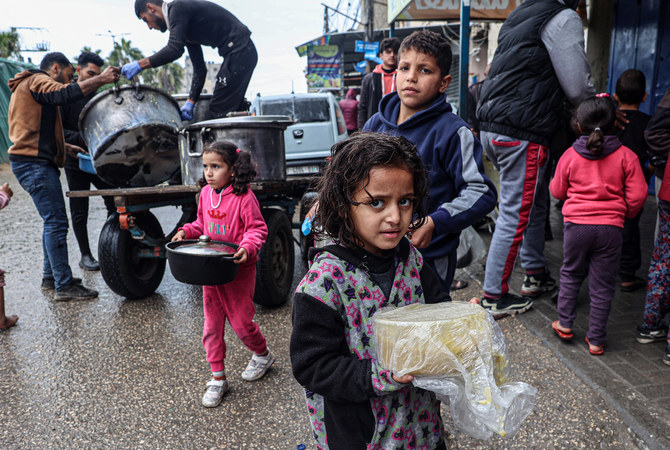
- A UN-backed report published in March said famine was imminent and likely to occur by May in northern Gaza
GENEVA: The Gaza Strip could surpass famine thresholds of food insecurity, malnutrition and mortality in six weeks, an official from the World Food Programme said on Wednesday.
“We are getting closer by the day to a famine situation,” said Gian Caro Cirri, Geneva director of the World Food Programme (WFP).
“There is reasonable evidence that all three famine thresholds — food insecurity, malnutrition and mortality — will be passed in the next six weeks.”
A UN-backed report published in March said that famine was imminent and likely to occur by May in northern Gaza and could spread across the enclave by July. On Tuesday, a US official said the risk of famine in Gaza, especially in the north, was very high.
Cirri was speaking at the launch of a report by the Global Network Against Food Crises, an alliance of humanitarian and development actors including United Nations agencies, the World Bank, the European Union and the United States.
In its report, the network described the 2024 outlook for the Middle East and Africa as extremely concerning due to the Gaza war and restricted humanitarian access, as well as the risk of the conflict spreading elsewhere in the region.
“As for Gaza, the conflict makes it difficult and sometimes impossible to reach affected people,” Cirri said.
“We need to scale up massively our assistance... But under the current conditions, I’m afraid the situation will further deteriorate.”
The United Nations has long complained of obstacles to getting aid in and distributing it throughout Gaza in the six months since Israel began an aerial and ground offensive against Gaza’s ruling Islamist militant group Hamas.
Israel has denied hindering supplies of humanitarian aid and blames aid agencies for inefficiencies in distribution.
Israel’s military campaign has reduced much of the territory of 2.3 million people to a wasteland with a humanitarian disaster unfolding since Oct. 7, when Hamas ignited war by storming into southern Israel.
Cirri said that the only way to steer clear of famine in Gaza was to ensure immediate and daily deliveries of food supplies.
“They’ve been selling off their belongings to buy food. They are most of the time destitute,” he said.
“And clearly some of them are dying of hunger.”
Jordan King, Kuwait Emir stress on importance of reducing regional tensions, avoid escalation
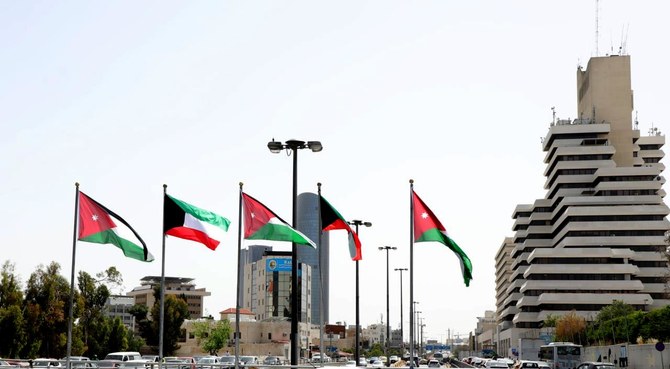
DUBAI: King of Jordan Abdullah II and Emir of Kuwait Sheikh Mishal Al-Ahmad Al-Jaber Al-Sabah stressed on the importance of reducing tensions in the Middle East and avoiding military escalation, according to Petra News Agency.
A joint Jordanian-Kuwaiti statement was issued on Wednesday after the Emir’s two day state visit to the Kingdom.
Both leaders discussed ways to enhance a joint Arab action aimed at confronting emerging regional challenges as well as serving common Arab issues.
The leaders affirmed their support for any steps that ensure the security and stability of the region and stressed the importance of giving priority to dialogue and diplomatic solutions in resolving differences and conflicts.
Their Majesties and Highnesses discussed reaching a just solution to the Palestinian issue and implementing the two-state solution.
The discussions also included talks on investment and tourism, as well as ways to increase trade between Jordan and Kuwait.



